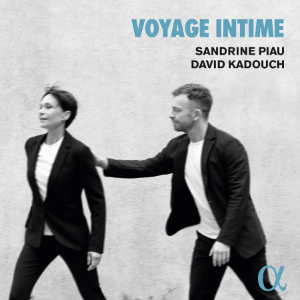
Voyage intime
Sandrine Piau (soprano)
David Kadouch (piano)
rec. 2022, Teldec Studios, Berlin
Booklet notes in French and English. Song texts in French, German and English
Alpha Classics 911 [61]
According to Alpha’s publicity for this disc, French soprano Sandrine Piau and French pianist David Kadouch have formed “a new duo whose first concerts have been enthusiastically received”. Piau explains the recital’s programme and title: “The promise of new horizons, the joy of new encounters: the journey in all its forms was the common thread.” She also notes in a conversation between the artists “the theme of people being snatched away from the land of the living” present in a number of songs; that includes the opening number, Liszt’s song in German about an aquatic creature which lures a boy to his watery grave. Liszt also closes the programme, with Victor Hugo’s curt and cryptic lyric Comment, disaient-ils, no less impressive both vocally and in Kadouch’s coping with Liszt’s keyboard demands.
The remainder of the recital has two parts: Lieder (Schubert, Clara Schumann, Hugo Wolf) followed by mélodies (Lili Boulanger, Duparc and Debussy). In this demanding programme of some of the best-known German and French songs, the 57-year old singer’s voice is in very good shape, mostly pure and sweet, only a very few taxing moments apart. Two of Wolf’s Mörike-Lieder get interpretations that match their quiet rapture, while Begegnung catches the breathless expectation of young love.
The Schubert group comprises especially renowned Lieder, much loved and much recorded. In the Mignon songs, Piau is straight with little of what has been (unhappily) called an “interventionist “style. This suits Goethe’s elusive young character well. Kennst du das Land is one of Goethe’s most famous poems, and if Schubert’s setting does not quite do it justice, Piau almost persuades us that it is worthy of its text.
In Erlkönig, she differentiates well enough between the three voices (child, father and the Erlking), if not as much as some singers who can sound affected if they overdo. Piau’s singing of the child’s later cries of “Mein Vater, mein Vater” sound almost shrill, but that too is in proportion with the sense of rising terror that she suggests both here and in Clara Schumann’s brilliant setting of Heine’s Lorelei.
A more mysterious, quieter kind of terror pervades Schubert’s “Death and the Maiden”. Piau fills it with foreboding; the mournful dactyls are well sustained at a not-too-funereal pace, with the optional lower D for the final note on the second syllable of schlafen (to sleep). Graham Johnson in his great book on Schubert’s songs writes that the ossia of the higher D is regarded as an honourable alternative,but this more rarely heard option sounds preferable, because it is more final. Piau seems to find almost a different voice for a note so low for a soprano.
Duparc opens the French half of the recital with L’invitation au voyage. Baudelaire’s evocative text is itself part of the the European literary afterlife of Mignon’s Kennst du das Land, one of the echoes between the German and French poems here. Piau offers all the luxe, calme, et volupté of the song’s famous refrain. In La vie antérieure, the vocal climax finds her slightly stretched for a brief moment, but the interpretation is enchantingly engaged, and Kadouch admirably manages the midpoint taxing pianistic storm.
Lili Boulanger’s important Clairières dans le ciel (Clearings in the sky) is a cycle of thirteen songs, integrated by musical cross-references across the mélodies. That is not well served by extracting two songs and then separating them by a Debussy item. But that is perhaps done to bring out the relation between adjoining texts, and they are very well sung. The three Debussy pieces from his Cinq poèmes de Charles Baudelaire are among the highlights of the recital, exquisite in tone, line, nuance and vocal colour. These songs feature on numerous fine mélodie recitals, but few I know surpass these versions.
David Kadouch, an expert accompanist, also offers two short solos, Clara Schumann’s Scherzo and Boulanger’s Cortège, both welcome rarities sensitively played. The recording is well balanced between voice and piano, in a sympathetic acoustic. The booklet contains, in addition to texts and translations, a thought-provoking conversation between singer and accompanist about the album’s concept and contents. We learn that even the cover photo makes an (obscure) related point. Let us hope for more recitals from this duo, especially of French song.
Roy Westbrook
Help us financially by purchasing from



Contents
Franz Liszt (1811-1886)
Lieder aus Schillers “Wilhelm Tell”, S. 292
No. 1, Der Fischerknabe (Es lächelt der See)
Hugo Wolf (1860–1903)
Mörike-Lieder
No. 23, Auf ein altes Bild
No. 8, Begegnung
No. 12, Verborgenheit
Franz Schubert (1797-1828)
Gesänge aus ‘Wilhelm Meister’, D. 877
Lied der Mignon (II). Nicht zu langsam
Lied der Mignon (I). Langsam
Clara Schumann (1819-1896)
Lieder, Op. 13
Sie liebten sich beide
Lorelei
Scherzo No. 2 Op. 14 (piano solo)
Franz Schubert
Erlkönig, D328
Der Tod und das Mädchen, D531
Kennst du das Land (Mignons Gesang), D321
Henri Duparc (1848–1933)
L’Invitation au voyage
La vie antérieure
Lili Boulanger (1893-1918)
Clairières dans le ciel:
No. 6, Si tout ceci n’est qu’un pauvre rêve
Claude Debussy (1862-1918)
Cinq Poèmes de Baudelaire, CD 70:
No. 4, Recueillement
Lili Boulanger
Clairières dans le ciel
No. 8, Vous m’avez regardé avec toute votre âme
Cortège (1914) (piano solo)
Claude Debussy
Cinq poèmes de Baudelaire, CD 70
No. 3, Le jet d’eau
No. 5, La mort des amants
Franz Liszt
Comment, disaient-ils (Victor Hugo), S. 276


















